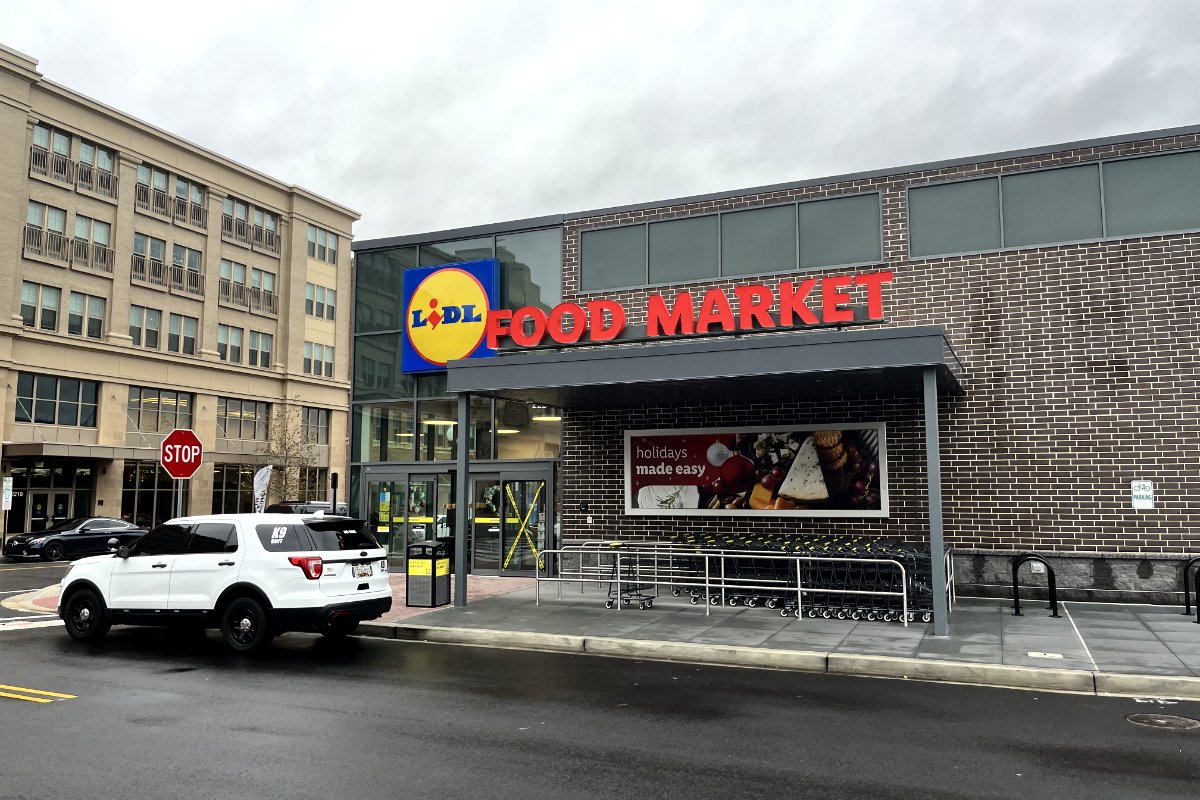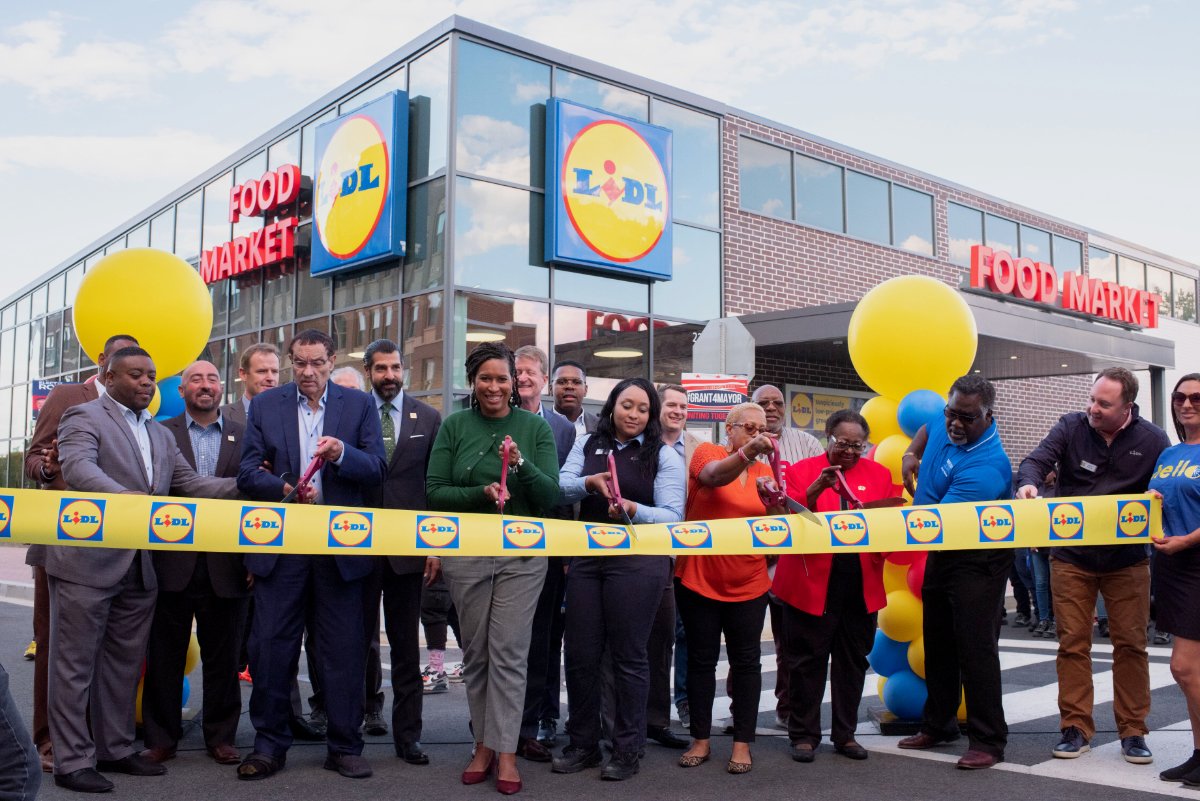The recent opening of the German grocery chain in Southeast DC gives residents a much-needed source for healthy, affordable food. Many hope it will drive other solutions to food insecurity in the under-served area.

The recent opening of the German grocery chain in Southeast DC gives residents a much-needed source for healthy, affordable food. Many hope it will drive other solutions to food insecurity in the under-served area.
February 6, 2023

Photo credit: Ciara O’Brien
Although the balloon arches have been taken down and the “now open” signs are long gone, the first Lidl grocery store in southeast Washington, D.C. still feels new. Just over four months after the grand opening, shoppers browse through a wide selection of fresh produce, baked goods, and much more.
Ward 7 resident Lucy Rhodes walked into the discount grocer for the first time in search of cat food, but left with a full cart. “There’s a lot of stuff here that I just can’t get at Safeway, and the prices are great,” she said. “I’ll definitely be coming back.”
In Wards 7 and 8, residents have often had to travel at least three miles across the Anacostia River or go into Maryland to buy groceries. But Lidl, a German chain that established its U.S. headquarters in Arlington, Virginia in 2015 and now operates more than 20 stores in D.C. and nearby parts of Maryland and Virginia, is giving residents a closer option for accessing nutritious and affordable food—and laying the groundwork for additional food-access solutions in the area.
According to the latest update to D.C. Hunger Solutions’ report, “Still Minding the Grocery Gap in D.C.,” the gap between the number of stores in the highest and lowest income neighborhoods in D.C. has continued to increase since it was first published in 2010. Although poverty levels have decreased across the District, the disparities between the highest-income (Ward 3), and the lowest-income ward (Ward 8), are still significant.
The report found that 23 percent of Ward 7 residents lived below the poverty line in 2021, and there were only two full-service grocery stores for its more than 80,000 residents. In comparison, Ward 3 hosted 13 full-service grocery stores for its approximately 85,000 residents.
“We want to make sure that we are looking at the entire system and not relying on one avenue to support residents in the District.”
“When we think about that specific Lidl store, we’re just overall thrilled,” said LaMonika Jones, interim director of D.C. Hunger Solutions. “Not only is there a place where residents can shop locally, but those that are SNAP-eligible are able to use their SNAP benefits. We’re excited that there are more grocery stores popping up and continuing to offer a solution to the lack of fresh food in the District overall.”
However, she also acknowledges that diversifying types of food access points is ideal in addressing the problem. “It’s important to look into opening up grocery stores, as well as accessing our nutrition assistance programs through policy,” she said, “but we want to make sure that we are looking at the entire system and not relying on one avenue to make sure that we can do as much as we can to support residents in the District.”
Lidl’s location at Skyland has been in the making for more than a decade. Redevelopment plans at a dreary intersection in southeast D.C. had been in the works for years, but were slowed by legal battles and concerns from displaced retail tenants—including a liquor store, a discount mart, and a beauty supply store—and concerned neighbors.
In 2002, the District intervened and began its acquisition of the Skyland site. According to a tally by the attorney general’s office, D.C. issued $28 million in payments to encourage the original businesses to leave.
As for the businesses that did not want to sell, the city used eminent domain to force them out, leading to a dozen court cases that cost the District an additional $1 million in outside legal expenses and more than 10,000 city attorney hours.
In 2014, Walmart signed a lease with the city and secured plans to build five stores in the District, including two in Ward 7, but the company ultimately pulled out due to a 1997 restrictive covenant from the Safeway across the street that limited competition in the neighborhood. Although Walmart would have been located outside of the restricted zone, the parking lot was not. These covenants are common across the retail sector, but have been proven to hurt communities and overall food access.
“The two stores they decided not to open would’ve been east of the river, which is a big deal for us because it’s an area that is looking for both food options and retail options,” said John Falcicchio, deputy mayor for planning and economic development in the District of Columbia.
After Walmart backed out, the city used Tax Increment Financing (TIFF) and grants for infrastructure to keep the larger development project moving forward. “Lidl is the grocer that stepped forward after a conversation with many different potential grocery partners,” Falcicchio added.
Until now, Catherine Jackson, another longtime Ward 7 resident, has cycled between Safeway, Giant, and Aldi for her grocery needs. She usually follows sales, even if it means adding an additional 20 minute drive to her commute.
“I like this store,” she said of the new Lidl, as she pushed her cart through an aisle of Lidl’s meticulously curated private label products. “This is my fourth time here since opening. The price is right, and they have German goods, which is fun and different.”
Ultimately, what has made Lidl successful in Skyland has been their willingness to hire locally and work with local organizations.
Ninety percent of Lidl Skyland’s more than 60 employees are residents of Wards 7 and 8. They are offered a starting wage of $16.50 per hour, as well as healthcare and comprehensive benefits starting at under $25 per paycheck. The store also works with the Capital Area Food Bank to create more equitable access to food and opportunity. Most recently, they sold limited-edition reusable tote bags designed by local children, with 100 percent of sales benefiting Martha’s Table, another local nonprofit.
“They’ve actually made themselves part of the community,” said Falcicchio. If the relationship continues, customers will develop loyalty to the store, he adds.
Still, many advocates agree that grocery mega chains like Lidl are not a long-term solution to the broader challenges of food insecurity—and more community-based alternatives such as neighborhood markets and community groceries are also needed in Ward 7.
“We’re looking at all sorts of models,” said Falcicchio. “We hear from a lot from residents that they want a supermarket, and we definitely understand that desire to want the biggest and the best. However, in some neighborhoods, there just isn’t a property with the footprint to support a supermarket.”
In addition to the District’s efforts to pave the way for the recently opened Lidl, other—often smaller and more local—food access options are becoming available with the support of community members and organizations. Good Food Markets, a community grocery that collaborates with neighborhood groups to improve food access in underserved communities, also opened a new store in the Bellevue neighborhood of D.C.’s Ward 8 last year.
And The Fresh Food Factory Market is a grocery store that sells affordably priced fresh and healthy foods without taking up that many square feet. Its flagship store is nestled inside the Anacostia Arts Center and allows residents greater access to organic and locally grown foods, as well as healthy cooking classes and a variety of other events. In 2021, they received a Food Access Fund grant from the District to open a location in Kenilworth in Ward 7.
“It’s important that we don’t lose sight of an even larger goal, which is to make sure that people in Ward 7 and 8 have the same options and food access that those in the other six wards have.”
Mayor Muriel Bowser’s goal is for everyone living in the District to be able to walk to at least one food access point in their neighborhood. “We need a combination of those small, medium, and large format stores in order to be able to do that,” Falcicchio said.

The ribbon-cutting ceremony for the new Lidl in Washington D.C. Mayor Muriel Bowser is at the center of the photo. (Photo credit: Khalid Naji-Allah)
With this goal in mind, there are several plans for creating more food access points on the horizon. The application for another round of Food Access Fund grants, available for food-related businesses looking to expand within D.C., just opened in December.
Although the Lidl at Skyland has finally become a reality—after years of work from community leaders and resident—it’s only one piece of the bigger food-insecurity puzzle for the District.
“It’s important that we don’t lose sight of an even larger goal,” Falcicchio said, “which is to make sure that people in Ward 7 and 8 have the same options and food access that those in the other six wards have.”

October 9, 2024
In this week’s Field Report, MAHA lands on Capitol Hill, climate-friendly farm funding, and more.
October 2, 2024

October 2, 2024

October 1, 2024

September 30, 2024

September 25, 2024

September 24, 2024

Like the story?
Join the conversation.